News & Events in Belarus
Meeting with Putin, hot conference call, prosecutor’s report, port logistics in President’s Week
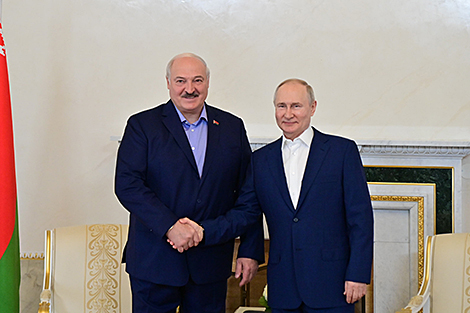
The work schedule of the Belarus president is always full of events. Aleksandr Lukashenko holds conferences and working meetings on the most topical matters concerning the country’s development, regularly visits the regions, goes on foreign trips and welcomes foreign guests, talks to reporters, signs decrees and laws. And even if there are no public events, it does not mean that the head of state does not work. It must be said that even when he relaxes, for instance, by playing ice hockey or chopping firewood, Aleksandr Lukashenko happens to find the time to give yet another instruction. All the decisions must be prompted by life, he likes to say.
The President’s Week project is intended for those, who want to keep up with the head of state, be up-to-date on the latest statements and decisions of the Belarusian leader.
What does Aleksandr Lukashenko think about military ambitions of NATO and Poland? Can Ukraine be dismembered? What prevents PMC Wagner personnel from going on a sightseeing tour to Warsaw and Rzeszow? What does the failure of the Ukrainian army’s counteroffensive mean? What has the Russian army accomplished? For what did the Belarus president thank his Russian counterpart? What should be the key feature of the Belarusian-Russian economic plan?
Details of the harvesting campaign and what made Aleksandr Lukashenko upset, why the agriculture and food minister will get a new job as the president’s aide for Vitebsk Oblast, and what regions need help as far as agriculture is concerned.
A report by the prosecutor general, Belarus’ export via Russian ports, and fateful laws are also in the new episode of BelTA’s special project President’s Week.
THREE BLOCKS. What did Lukashenko and the prosecutor general discuss at the beginning of the week?
On 17 July Belarus President Aleksandr Lukashenko heard out a report from Prosecutor General Andrei Shved. At the beginning of the meeting the head of state briefly listed the key matters he wanted to raise with the prosecutor general. Among them was oversight over the compliance with the rule of law in defense, security, and law enforcement agencies, approaches to organization of effective work on these matters. Another topic was the ongoing investigation into the genocide of the Belarusian people. Aleksandr Lukashenko also drew attention to the role of the Prosecutor General’s Office in overseeing and identifying problems in agriculture and manufacturing sector.
“I would like to discuss with you these three blocks of issues,” Aleksandr Lukashenko said.
Establishment of a system of military prosecutors
“This is not the first time that I have raised the issue of control, prosecutorial supervision in the Armed Forces, compliance with laws and so on. What is the state of things today?” the Belarusian leader asked. “A great number of proposals are coming, including proposals to create some system of military prosecutors. I am saying ‘some system’ because we are not planning to return to that Soviet practice. But we should have some elements of it,” the president said.
According to Aleksandr Lukashenko, there are many points of view on this issue. He asked about the rationale behind Andrei Shved’s position. “I know your position, but what are the reasons behind it? Indeed, we do need to strengthen control over compliance with the law among the military. I have already told you that the prosecutor’s office had somewhat moved away from the power bloc some time ago”, the president said.
The head of state noted that it is not only about the army, because uniformed services include many other agencies like the Emergencies Ministry, the Ministry of Internal Affairs, and the State Security Committee. “Prosecutors should keep an eye on everything,” the Belarusian leader is sure.
After delivering his report Prosecutor General Andrei Shved told journalists that the proposal to establish the Chief Military Prosecutor’s Office “was prompted by a number of objective circumstances, including the situation evolving around the country”. Aleksandr Lukashenko studied these proposals and gave an instruction to discuss them with the leadership of law enforcement agencies and other government agencies. The final decision on the establishment of the new institution will be made only after another conference hosted by the head of state.
According to Andrei Shved, this initiative does not mean the return to the previous practice. He recalled that the Belarusian military prosecutor’s office was disbanded in 2014 when the situation in the world was completely different, including the military situation. “This is not about recreating what we used to have, but about creating the Chief Military Prosecutor’s Office, the staff of which will be several times smaller than that of the Belarusian Military Prosecutor’s Office. The thing is that if such a decision is made, military prosecutors will exclusively supervise the compliance with the rule of law in the military at various periods of time. The final decision will be made only after another conference hosted by the head of state,” the prosecutor general said.
Genocide investigation
“The second point is the genocide. A number of proposals have been made to raise awareness of the genocide of the Belarusian people during the Great Patriotic War in our society, especially among young people. Young people should know what happened. Why? To prevent it from happening again,” the president said.
Aleksandr Lukashenko wondered how this work is being done at the moment and what is to be undertaken in the future.
“The intensity of investigative actions is not dwindling. So far we have identified more than 2,500 previously unknown settlements that were destroyed. At least 80 of them shared the fate of Khatyn,” the prosecutor general shared the details with reporters.
In the course of investigating facts of the genocide 17,000 witnesses have been interviewed and a lot of work has been done to perpetuate the memory of the war victims.
“We are doing a lot of outreach with young people. It is extremely important to communicate the outcomes of the genocide investigation, the truth about the genocide to every citizen of our country, especially our children. In this regard information was presented about individual aspects of the introduction of the investigation’s results into the learning process and ideological work. Instructions were given, including instructions to prepare the necessary materials that should be introduced into academic curricula of every school starting from 1 September. This task will be fulfilled,” Andrei Shved emphasized.
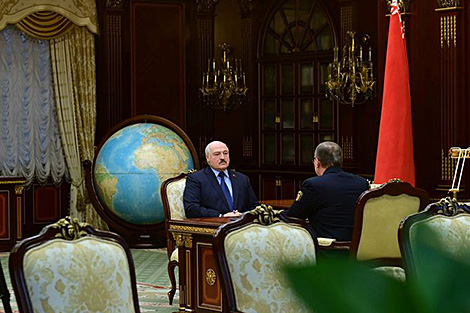
Key economic matters
The third topic of the report was also important, the head of state stressed. “Instructions related to key economic matters have been given to the prosecutor general. As far as agriculture is concerned, the main issues here are livestock loss and problems related to salary payments. You should always keep an eye on the matter. Preservation and so on,” the president noted.
In the same vein, the prosecution service should counter and prevent manifestations of corruption. “This is commonplace, first of all, in the industrial sector. What is the state of affairs in this regard in Gomel Oblast? There were many complaints some time ago. How is the new oblast governor coping with these issues?” the Belarusian leader asked.
According to Andrei Shved, the intensity of checks and inspections by law enforcement will not decrease: there are still a lot of problems in the agricultural sector and they are not limited to mismanagement.
“Violations of the land reclamation law have been revealed, 14 criminal cases have been initiated. It has been established that money gets stolen in almost all regions. According to preliminary results, at least Br800,000 has been stolen. In addition to that, about 1,500 hectares slated for land reclamation are still not used for agricultural purposes, although more than Br9 million has been spent on their reclamation,” he noted.
Andrei Shved warned that prosecutors are determined to make sure that all crimes will be investigated. “Do everything necessary to work in compliance with the law,” he said addressing heads of agricultural enterprises.
FINAL DECISION. How does Belarus compete with Canadians and will Belarus build ports in Russia?
On 18 July the Belarus president hosted a conference to discuss the creation of port facilities. Aleksandr Lukashenko noted that the matter of acquiring port facilities to transship Belarusian cargoes was already discussed in January 2023. The focus was on the transshipment of potash fertilizers. This matter was also revisited on 18 July, which is only natural considering the large volumes of shipments but the matter of shipping oil products was also thrown into the mix. “The areas of work have been identified. The necessary decisions have been made. It’s time to compare notes and, if necessary, to fine-tune and coordinate our further actions and plans,” the president said.
“The situation and the external political environment are changing vary rapidly today. Yet, credit where credit is due, the Belarusian economy keeps working and keeps finding new opportunities in these complicated conditions,” Aleksandr Lukashenko stressed. “We must quickly respond to all challenges and ensure the delivery of export cargoes to customers. It is crucial to take decisions fast.”
In this regard, the head of state outlined a number of key talking points. One of them is the state of progress to create Belarus’ own facilities for maritime transportation. “It is understandable that we were forced to leave traditional ports and now we use all ports of the Russian Federation to transship our freight, which is about 20 million tonnes,” the president noted.
“Are there any appreciable results in this direction?” Aleksandr Lukashenko wondered. “Which ports are used to transship potash fertilizers and oil products? What are the problems in this regard? Do we have an understanding of how much potassium we can transship through the ports of the Russian Federation on acceptable terms?”
Apart from that, there are alternative options for cooperation in the northwestern region of Russia. “This should be the key issue,” Aleksandr Lukashenko noted. In his words, Belarus has two transshipment options now - Murmansk and Primorsk. Each has its own advantages and disadvantages.
“It is necessary to finally make up our minds on what we need – build a terminal, a port or upgrade an existing port and immediately get down to work,” the head of state emphasized. “As far as I know, we are building and upgrading capacities somewhere near Leningrad. At the same time, we have made little progress near Murmansk.”
Participants of the conference also discussed a draft decree on the export of certain types of goods.
Higher volumes
During the conference First Deputy Prime Minister Nikolai Snopkov said that this year the transshipment of Belarusian cargoes via Russian ports has quadrupled in comparison with the same period of last year. “In January-June 2022 we transported 1.5 million tonnes of Belarusian cargoes through Russian seaports. This year the volume has already amounted to almost 6 million tonnes, an increase of 400%. Almost the entire volume, or 97%, is chemical mineral fertilizers, oil and petroleum products,” Nikolai Snopkov said.
The work to organize the transshipment of Belarusian potash through the seaports of the north-west and south regions of Russia began in April 2022. Today the country can transship about 1 million tonnes of merchandise per month, or 12 million tonnes per year. Belarus has managed to achieve cost-effective transshipment in the terminals of St. Petersburg ports. In H1 2023 as much as 2.7 million tonnes of potash fertilizers was shipped through these ports.
“The main ports are Bronka, the Baltic Shipbuilding Plant, Sea Fishing Port, and Keystone Logistics. Bronka is the basic one in accordance with the agreements between the Belarusian Transport Ministry and the Russian Transport Ministry,” Nikolai Snopkov noted.
Export of potash fertilizers, logistics, and competition
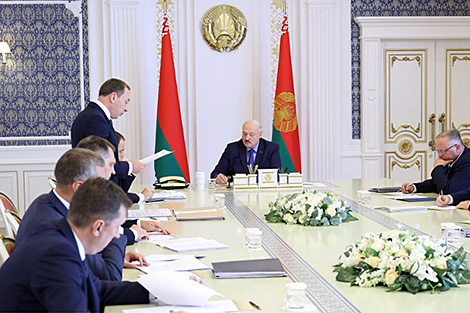
After the conference Nikolai Snopkov shared a number of new details with reporters. Thus, Belarus intends to export 8 million tonnes of potash fertilizers this year. And despite an increase in logistics costs due to the introduction of sanctions: “From two to five times in terms of transshipment. In railway transport, which has become longer, it was about 2-2.5 times.”
“In a bid to hit assigned targets, we will secure sales of 8 million tonnes of fertilizers this year. Meanwhile, Belaruskali operates in the black. The company took care of its investment program for H1 2023 by investing Br600 million already. I mean the company’s investments are on schedule,” the first deputy prime minister emphasized.
The Belarusian company is the world’s second largest producer of potash fertilizers. Canadian companies hold first and third positions. “This suggests that, in principle, the sales system has been built effectively, despite a massive increase in costs,” Nikolai Snopkov said.
In his words, due to the pressure of sanctions Belarus has lost 5.5 million tonnes out of 9-10 million tonnes the country has been exporting per year on the average for the last few years. Respectively Belarus can export about 4.5 million tonnes to markets of friendly countries. “This year we will ship 8 million tonnes or virtually twice as much potassium to friendly markets in order to substitute the lost markets of unfriendly countries. Here is the conclusion: Canada is a competitor for us but as you can see from the figures, we are handling this competition just fine,” the official stressed.
Belarus has found alternative ports to replace those that it had lost due to the sanctions: “Today we can ship 12 million tonnes [of potash fertilizers] per year. Over the previous 10 years, we exported 10-12 million tonnes per year on average.”
“We see the situation on the market [the global market for potash fertilizers]. It is believed that this is not the bottom yet [the price has not reached the bottom]. Today, in principle, all companies stick to the ‘volumes above prices’ strategy. On the instructions of the president, we have been doing this since last year. In other words, we prioritize volumes over prices. After all, the production costs of Belaruskali allow us to do this. And we can keep this price for a long time. Yet, the issue of logistics is becoming the key one. In order to effectively sell fertilizers, keep Belaruskali profitable, and, accordingly, ensure payments to the state budget, we need optimal and efficient logistics. This is what we will continue to work on,” Nikolai Snopkov said.
Construction of Belarus’ own ports
In the near future the government will submit to the president the final version of its proposals to minimize transshipment costs in the mid-term.
“We have a product that is in demand in the world. We will ship it where transportation costs are the lowest. There may be variations. There are stable points of shipment, where we clearly understand volumes and costs, and variable points that compete with each other for our orders. We will take advantage of it in order to get the minimum transshipment price. This is the main task. We must minimize logistics and transshipment costs,” Nikolai Snopkov emphasized.
When asked about whether building a port makes sense, the official said: “Honestly, it depends. We just need to sit down and make estimates. The president always demands to keep emotions out of decisions and base them on dry numbers. The only thing I know for sure is that we will make estimates not for the current state of affairs. We will consider ‘the life cycle of a product’ (there is such a term). A port is also a product. Its life cycle is 10-15 years. We will make estimates proceeding from this life cycle and figure out whether we need it or not, whether we build it or not.”
Nikolai Snopkov emphasized that such facility as a sea port will be a national asset abroad. It is good to have such an asset if it works and if it is effective. On the other hand, right now transshipment needs to be as cheap as possible. “Because we cannot afford to include investment costs in transshipment today. The price [for potash fertilizers on the international market] is too low today and we must count every dollar and save on logistics as the president said. Because the price is truly close to the breakeven point and we are not sure it has hit the bottom yet,” the first deputy prime minister said.
The government intends to make up its mind on all the existing issues soon and work out an optimal variant.
FROM LOANS TO MILITIA. What important laws did the president sign last week?
The lawmaking process in Belarus includes several stages. Bills are prepared and thoroughly discussed in the House of Representatives of the National Assembly – the lower chamber of the Belarusian parliament. Once the bill is passed by members of the lower chamber, it is the turn of senators from the upper chamber – the Council of the Republic. Once they approve the bill, it is up to the president to sign the bill into law or not. Aleksandr Lukashenko signed a number of significant laws last week.
Inevitability of prosecution for genocide
Aleksandr Lukashenko signed the law on amending the Criminal Procedure Code of the Republic of Belarus. The document is designed to make punishment for genocide and other grave crimes inevitable and to restore historical justice.
According to the law, it is inadmissible to refuse to open a criminal case and it is inadmissible to terminate a criminal case against individuals, who have died and have committed imprescriptible crimes against peace and security of humanity, including genocide as well as war crimes.
If the guilt of the diseased individual is proven, a guilty verdict will be pronounced against the said individual without assigning a penalty.
Simpler construction procedures
The president signed the Code on Architecture, Urban Planning and Construction. The document puts together and systematizes normative instructions from various legislative acts.
The code allows oblast administrations, the Minsk City Executive Committee to make decisions on building facilities in the respective regions even if they deviate from the approved construction plan provided all legal requirements and restrictions are observed.
Construction processes for various types of facilities have been streamlined. The document lists cases when design documentation is not mandatory or can be done in a concise form. The document also optimizes procedures to build and renovate single-family homes, and introduces a notification principle in relation to construction and installation works.
The matters related to suspension of construction and conservation of facilities have been regulated.
National interests in publishing business
The head of state signed the law on amending the law on publishing business in the Republic of Belarus. The law is aimed at improving the protection of national interests in publishing business.
The law expands the list of reasons for the reregistration of publishing houses and manufacturers of printed products and for suspending the state registration of publishers.
Apart from that, the Information Ministry is authorized to make decisions on suspending the state registration of publishers. Courts no longer have to pronounce verdicts in favor of suspension of the state registration of publishers.
Protection of interests of borrowers
Aleksandr Lukashenko signed the law on amending the law on banking business. The document amends Belarus’ Banking Code in order to improve the legal regulation of banking relations taking into account the effective legislation, the law enforcement practice, and international experience. The status of the National Bank of the Republic of Belarus has been enhanced as the body in charge of ensuring financial stability in banking industry and other industries it regulates. The level of legal protection of consumers of banking services has been increased. Excessive financial burden on borrowers has been ruled out.
In order to enhance the legal protection of consumers of banking services, the law prohibits specifying increased interest rates in loan contracts if the borrower fails to repay the loan on time. The law limits the size of penalties and fines the borrower is supposed to pay due to their failure to honor commitments as part of the loan contract. The law also specifies when the bank can demand premature repayment of the loan from the borrower. The list includes conditions, which objectively create significant risks for a default on a loan.
The law provides for the establishment of qualification requirements and business reputation requirements for officials performing key functions in a bank. Adding this norm to the Banking Code will ensure the formation of effective corporate governance in banks.
People’s militia
Aleksandr Lukashenko signed the law on people’s militia. The document creates the legal framework for voluntary participation of citizens in enforcing martial law, which is declared in administrative and territorial units of the republic. The document also enables additional conditions for providing assistance to territorial police units as they discharge duties and protect property of all kinds from criminal assaults and other encroachments.
Combat training centers
Belarus ratified an agreement with Russia on creating and operating combat training centers for the joint training of military personnel of the armed forces. The head of state signed the relevant law.
The agreement regulates matters concerning the creation and operation of combat training centers on the basis of army units in Belarus and Russia. It determines their main tasks and how the defense ministries are supposed to interact in the course of organizing comprehensive support for these centers.
BATTLE FOR FOOD. In what war does Aleksandr Lukashenko want Belarusians to fight 24/7?
Friday, 21 July was the moment of truth for the country’s entire agribusiness. Belarus President Aleksandr Lukashenko hosted a conference call to discuss the harvesting campaign. Heads of central government agencies gathered in Minsk while oblast governors in the regions stayed in touch thanks to video conference.
It was a traditional event. The president had repeatedly heard out reports from officials in this manner over the years of his presidency. According to the terminology of defense, security, and law enforcement agencies, these events focus mostly on prevention instead of punishment. Results of the harvesting campaign (not only cereals but also an entire bunch of other crops) will be summed in 1.5-2 months but now, the start of the harvesting campaign is the time to look each other in the eyes, detect the worst problems, and try to solve them promptly. Although one does not swap horses when crossing the ford, a number of personnel management decisions were made.
“Harvesting is always the number one issue. In fact, this is the moment of truth and the finish line of the great efforts by the entire agricultural industry during an agricultural year,” Aleksandr Lukashenko said. “I’ve invited you here for the conference hall in this composition because, frankly speaking, I fear that people may relax due to weather conditions. It always happens like that in Belarus: dry weather followed by floods. But keep in mind that it may happen and it is very likely to happen this year. After this drought we may have very humid and rainy weather in August. And we will get even less harvest due to our lack of organization because of the humid weather.”
“In order to ensure our own food security, to make sure that we have ‘bread on our table and things to go with bread,’ as people say, to make sure that processing enterprises are well-supplied with raw materials and livestock is well-supplied with feed, we need to mobilize now. Harvest time is our battle for food if you will. Everything depends on this battle. War is war. The winner is the one who is better prepared, who has used all the resources and fights from dawn to dawn. As I often say, it is better to fight on this front than in a hot war,” the Belarusian leader stressed.
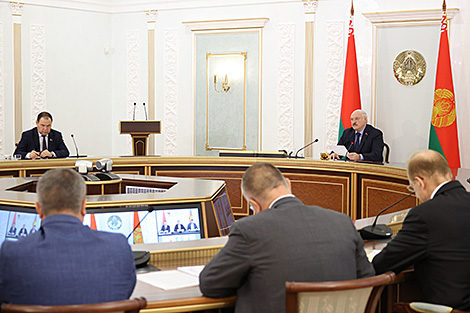
Harvesting bread is a nationwide effort. “I know that many men, especially those who come from the countryside, specifically take vacations in July and get a job as combine operators in order to earn good extra money for their families (pay for back-to-school expenses, for example)," Aleksandr Lukashenko noted.
Problem issues
At first glance the spectrum of the discussed problems relating to the harvesting campaign has remained the same for years. Not only the president but also those, who directly oversee these matters – the chairman of the State Control Committee and the prosecutor general – made remarks about these matters during the conference call.
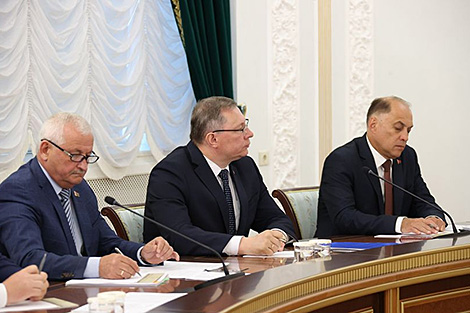
It is always important to gather in the crops within an optimal timeframe and without losses, to ensure harvest preservation, and prepare the soil for sowing winter crops. While doing that, it is necessary to carefully treat the machines and vehicles, repair and maintain them on time, buy new ones if necessary. It is necessary to address personnel shortages for the duration of the harvesting campaign by borrowing machine operators from other organizations. It is necessary to minimize unlawful manifestations such as thievery, drunkenness, falsification of figures, violations of fire safety rules. And it is important not to forget about hardworking Belarusians and true heroes of the harvesting campaign – from the organization of hot meals in the field and the provision of protective wear to timely and decent wages in addition to well-deserved awards and attention from mass media.
All these things were discussed during conference calls 5, 10, and 20 years ago. But then again the factor of prevention is important for preventing these problems from snowballing. The human factor is always a thing. And one has to admit that the scale of these problems grows smaller year after year. Even during this dry summer Belarusians aspire to get a harvest that would have been deemed record high at other times. Belarus is a world leader in the export of a number of foods. The country no longer has to import high-performance harvesters for fields with the yield in excess of over 40-50 centners per hectare because domestic harvesters are as good. Just like grain-drying facilities and many other things.
“All your wishes concerning support for agriculture have been backed by me. The necessary decisions to allocate budget loans to buy mineral fertilizers, fuel and lubricants, to repair machines and vehicles have been made. Respectively I have the full right to demand high results and returns. And as harshly as possible. Moreover, last year’s practice demonstrated that our agricultural organizations are capable of gathering in decent harvests,” Aleksandr Lukashenko remarked.
This time the president gave a genuine shock to officials and heads of organizations. Aleksandr Lukashenko said: “Let’s get back to our fields. The State Control Committee, the Prosecutor General’s Office, the Internal Affairs Ministry tell me that the situation is far from normal, let alone ideal.”
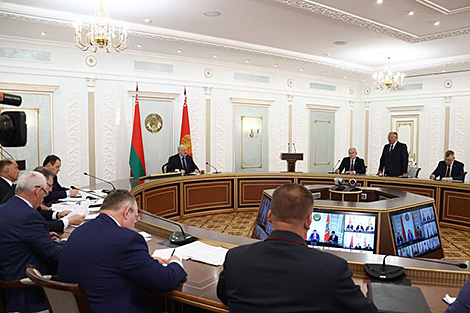
The readiness of machines and vehicles for harvesting represented one of the key complaints of the head of state. Although some oblast governors were quick to report that virtually all the harvesters are in good condition, however, there is a decent percentage of those, which have failed to pass technical inspections. Aleksandr Lukashenko said: “I warn you. Technical inspection is a testimony that harvesters and other machines and vehicles are functional. Anything else will not be accepted.”
Only functional machines and vehicles can gather in crops properly. And why would agricultural enterprises buy new machines and vehicles if some do not really care about what they already have? “If you spend your own money to buy them, go ahead. But you ask for machines today and you come for money tomorrow. Meanwhile, unrepaired vehicles and machines stay idle. Deal with it, Roman Aleksandrovich [Golovchenko, Prime Minister of Belarus] and deal with it harshly. It is time to move from idle talk and mantras to concrete measures,” Aleksandr Lukashenko told the government.
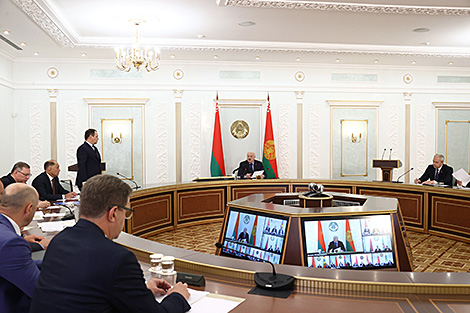
“Then again overreporting has always plagued agricultural enterprises. The prosecution service has found 185 cases across the country when machines were ready for work only on paper. This must never be forgiven! These inept executives will lead us to the devil knows where. 33 grain-drying complexes were not ready either,” Aleksandr Lukashenko noted.
“Well, and the most disgusting thing is thievery and alcohol abuse. Harvesting has just started while the Internal Affairs Ministry has already opened 61 criminal cases into the theft of fuel and lubricants and has detected nearly 2,200 administrative offenses. Heads of agricultural enterprises and district administrations and even oblast administrations already have these spells: don’t worry, harvesting has started, and we call everyone to account. There can be no leniency,” Aleksandr Lukashenko emphasized.
“We cannot defeat the same problems year after year. And where are the top officials of the oblast administrations, district administrations, and agricultural enterprises? During the harvesting period your office is in the field, at a grain storage facility,” the head of state said.
The situation in the regions
During the conference call the oblast governors presented reports on the situation in their regions. The head of state gave clear instructions to focus primarily on problems without self-evaluation.
The situation varies from region to region but it is understandable: while southern parts of the country have actively started harvesting, mass harvesting in northern parts will begin only in a week. Things are complicated everywhere but there is no catastrophe, the president was assured. Plans and roadmaps have been compiled in order to compensate for the shortage of cereals and first-cut grass. There are good projections concerning corn and a number of other forage crops. Some fields had to be reseeded due to the drought.
Promises were made to take into account complaints about machines and vehicles and to fix the situation as fast as possible.
A government decision has been made to import an additional amount of cereals from Russia. “The government assures me that this amount will be nearly enough to satisfy the country’s demand for food and forage grain. I have absolutely no doubt about it. I have also made a decision on buying cereals from Russia. The price is close to the prime cost of our grain for now, this is why the decision has been made. I’d like to hear what has been done in this regard. I will repeat what was said in Orsha: grain is comparable to the gold and foreign exchange reserves now. We can always use it and the price constantly rises. At least the prices that existed on the international market yesterday and today will not be repeated. That’s for sure. And if we have spare storage capacities, why don’t we fill them with reserve grain?” Aleksandr Lukashenko said.
Fuel was the only issue several oblast governors raised simultaneously. A lot of agricultural work has yet to be done and it is necessary to help with loans. Naturally, to help repay them. The president instructed the government to handle the issue: “You know that debts must be paid. If someone doesn’t pay up, then there will be problems after some time. But taking into account all the circumstances you and the government will sort it out and will submit proposals to me next week at the latest.”
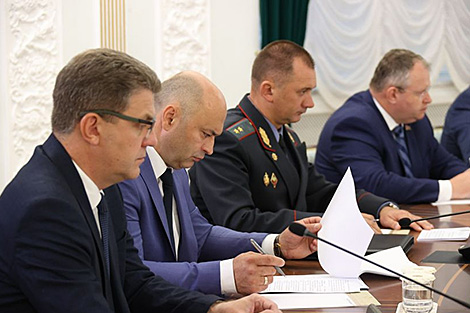
During the conference call Belarusian Finance Minister Yuri Seliverstov informed participants about the state of affairs concerning the payments of agricultural enterprises for fuel and other products they need to prepare for and carry out the harvesting campaign. The timely repayment of loans was also mentioned. “If you borrow money, you must repay it on time,” the president stressed in this regard. “Only then can you come to ask for more money (this is an exception).” Meanwhile, payments for delivered grain are always done on time. The oblast governors confirmed it.
Speaking about weather conditions, Aleksandr Lukashenko pointed out that the situation varies from region to region: soils have been affected more in some regions and less in other ones. “I understand perfectly well that these are not last year’s conditions. If it has not rained in the country for 40 days, then naturally all the districts have been affected somehow. But complaining about the disaster, about all the dried-out crops is wrong. No, we will not get last year’s record-high harvest but I don’t demand it from you. While you managed to harvest 10.5 million tonnes of grain of all crops last year, I ask you to deliver 9 [million tonnes this year]. And we can gather it in if we organize well and if we maintain good discipline,” the head of state stressed.
One has to admit that most of the problems concerning agribusiness have accumulated in eastern parts of the country. The problems affect not only the harvesting campaign but the overall approach to doing business. For instance, the preservation of cattle has been a problem for a long time. The problem was mentioned during the conference call, too.
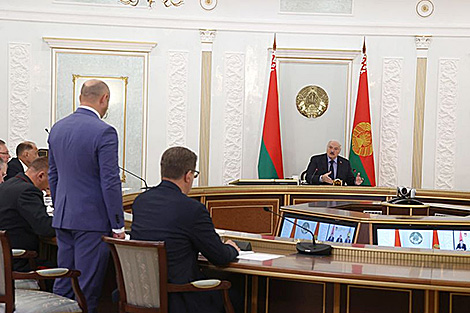
Aleksandr Lukashenko warned that Vitebsk Oblast, Mogilev Oblast, and Gomel Oblast have no space for retreat. “That’s it! Nowhere to retreat to! Eastern regions have to secure progress. They need to develop and give good dynamics,” the Belarusian leader stressed.
The president spoke even more harshly about Gomel Oblast although he was assured that the situation concerning the problem had been stabilized. “Make up your minds. Invite any minister for your aid. They will come and will provide assistance to you. But it is necessary to pull Gomel Oblast out of the swamp. It won’t do. A beautiful region. Beautiful people. But we are still floundering over there. This is why implement the most decisive measures,” Aleksandr Lukashenko said.
A new job for a minister
During the conference call it was revealed that Aleksandr Lukashenko will appoint current Agriculture and Food Minister Igor Brylo the president’s aide for Vitebsk Oblast. The official was already responsible for this region. Now the oblast administration will get another experienced executive. Moreover, there are plenty of tasks that need solving over there.
“So, starting with this harvesting campaign the agriculture minister will start working as the aide for Vitebsk Oblast. And Igor, you will have to report to me daily about the situation in Vitebsk Oblast. It seems to me that they have forgotten how to work. And everyone is waiting. They have some hope that someone will come, will bring money or something,” Aleksandr Lukashenko said. “You know our approaches over there. Everything must be implemented. You and Subbotin are responsible for it with your heads.”
The president also gave instructions to promptly select a candidate to be appointed as the new agriculture and food minister: “Roman Aleksandrovich [Golovchenko, Prime Minister of Belarus], select a candidate for the position of the agriculture minister. I want the candidate next week. We cannot proceed with harvesting if we don’t have the person responsible for it.”
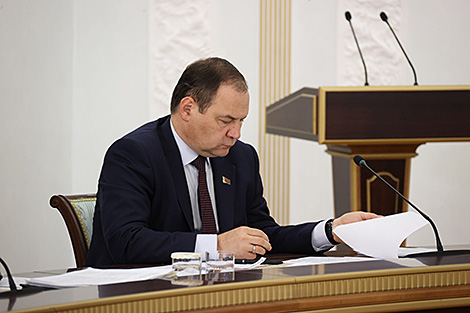
During the conference call Aleksandr Lukashenko told Aleksandr Subbotin: “I would like you to accept the new aide. But you will not have a calm life. You have to understand that I am not exiling Brylo. I do it so that we could put Vitebsk Oblast on its feet at last. He knows what to do. But we will talk about his work another time. But there will be no calm life there. And he will have a direct link to all of those, with whom he works as an equal today – ministers, members of the government. Although you have also worked in the government for a sufficient amount of time.”
By the way, after hearing out Aleksandr Subbotin’s report, Aleksandr Lukashenko even commended the Vitebsk Oblast governor for getting to know the intricacies of agriculture after working in other high-ranking positions previously: “I should say I am already glad to hear how precisely you speak and use agrarian terms. It means you will become good at it. You are already moving away from professorial language and are becoming a genuine agricultural process engineer.”
Disciplined personnel management
During trips to the regions and government conferences Aleksandr Lukashenko has repeatedly stressed the need to build a precise power vertical where people will be held accountable and will understand who is responsible for a specific area of work. The president is dissatisfied with the practice where people screw up but dodge responsibility by getting another job.
Aleksandr Lukashenko noted that all the necessary decisions in terms of personnel management had been made: “Once again I would like to reiterate it publicly. Today, not a single specialist, not a single head of an agricultural enterprise can be transferred to another job or resign without the approval of the chairman of the district executive committee. If he or she quits, no one in the country will be able to hire them until they submit a certificate from their previous place of work, a reference. In terms of power vertical... Not a single chairman of the district executive committee and others on the regional registry can quit their jobs either. It’s time to put things in order in terms of human resources. The same applies to personnel: not a single machine operator, a milkmaid, and other specialists in an agricultural enterprise (collective farm, state farm) can resign without the approval of the executive. Top-down vertical and responsibility.”
“I said it once and reiterate again: it is better to fight in the field than on the front! Is there someone who does not understand this? We need an iron order. With a competent executive an organization (a collective farm, state farm and others) operates efficiently. Personnel is all-important. Otherwise we will continue spending a lot of money, equipment, fertilizers, loans which can otherwise be spent on pensioners, healthcare, education,” the head of state said.
“If there is a return, then okay, we will give loans. But if there is no return, then what is there to talk about? There can be no discussions,” the Belarusian leader stressed.
Broken machines and vehicles from the manufacturer
Aleksandr Lukashenko pointed out that cases when farmers ask for new equipment or funds for it while having vehicles poorly maintained and being idle are unacceptable. “No equipment can stand idle. If you can’t repair it, you have to give it to back to the manufacturers. They will repair it and sell it at half the price,” Aleksandr Lukashenko said.
Moreover, the system has already been established in Belarus and produces fruits. For instance, Chairman of the Vitebsk Oblast Executive Committee Aleksandr Subbotin informed those present about how Vitebsk Oblast is implementing the instruction to repair all the broken vehicles and machines: “We are working intensively. This year out of this scrap we have assembled and will use 38 harvesters and 102 tractors. Both the central government and the ministry keep an eye on our work. Including visual control.”
Aleksandr Lukashenko asked Industry Minister Aleksandr Rogozhnik why individual agricultural enterprises had encountered malfunctions of newly bought Belarusian machines and vehicles according to oversight agencies. The industry minister replied: “I will look into these cases. But I assure you that the equipment has a sufficient reliability margin.” In support of his words he cited an example from a recent business trip to the Russian city of Kemerovo where he visited a farm that uses Belarusian agricultural machines. They did not have a single complaint about their work.
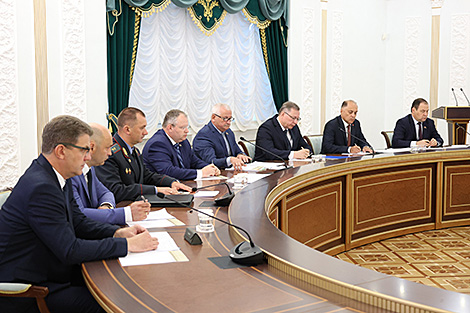
The president agreed that it is not only the quality of equipment that is important but also the conditions of its operation and maintenance. “The operation and reliability of the equipment depends not only on the equipment, but also on its use and maintenance,” he said. “But please look into these cases. There are complaints about the agricultural machinery supplied to local farmers.” The quality of equipment sold internationally and domestically should be uniformly good, the head of state noted.
Resulting instructions
Summing up results of the conference call, Aleksandr Lukashenko reiterated the issues that had been raised and sketched out his approaches to a number of topical matters.
Aleksandr Lukashenko drew attention to the matter of choosing the main agricultural crops that deserve most effort. Winter barley, rapeseed, and corn were mentioned. He spoke at length about advantages of winter barley and rapeseed but stressed he does not insist on growing them everywhere. The advisability of growing these crops should be evaluated locally. “There is no need to put pressure on people the way Nikita Khrushchev did with regard to corn farming. Although he was right. Even here, in Belarus. Consider this year. We would have a very hard time without corn. Despite the drought corn produces good results in all the fields. This is why there is no need to throw corn ears at the person, who is already dead and who turned out to be right,” Aleksandr Lukashenko noted.
“These two crops need to exist. They need to be grown,” the president concluded. “But technologies must be observed. There will be nothing without technologies.”
Speaking about the production discipline, Aleksandr Lukashenko drew attention to the need to observe rational approaches to tilling soil for future crops and to the organization of stubble ploughing where it is not a good idea to gather in chaff for animal husbandry industry. According to Aleksandr Lukashenko, it is necessary to be rational about corn crops and decide what has to be grown for silage and what has to be grown for grain maize. The president also made a few remarks about the acquisition of seeds, which are not made in Belarus, for instance, burclover. According to the head of state, in this case it is advisable to organize centralized purchasing for all agricultural enterprises in order to get a more attractive price thanks to the bulk purchase.
One of the instructions focused on recruiting additional machine operators for agricultural enterprises for the duration of the harvesting campaign: “The most important thing is that this year we have to finish working out the practice of borrowing machine operators, particularly from industrial enterprises. We need to clearly understand how many we need this year and how many we will need next year.”
“Authorized representatives and aides have to immediately go into the regions and provide all kinds of support to the oblast administrations with the organization of the harvesting campaign. It is up to you how to work there but don’t stand in the way,” Aleksandr Lukashenko said.
The president remarked he was also getting complaints about untimely payments from processing enterprises for the products supplied by agricultural enterprises and private farmers. In particular, milk and meat were mentioned. “Roman Aleksandrovich [Golovchenko, Prime Minister of Belarus], it is inadmissible. It is necessary to find money wherever you can. Farmers should not give away their produce. They should sell them. Come hell or high water but you have to find money to fix arrears to agricultural enterprises,” Aleksandr Lukashenko said.
Close attention should be paid to the formation of reserves. “Extra stock never hurt anyone. It is imperative to have reserves, stocks. We need to look not only around but also internally at our reserves that we can use,” the president said.
The head of state encouraged all the responsible individuals in the central government and the regional authorities to work hard to carry out the harvesting campaign and to treat the matter very seriously: “I repeat once again there is no time to start things slowly. We’ve already got things going by harvesting winter barley and partially rapeseed. Vitebsk Oblast has even started gathering in wheat. Pick up the pace. God forbid if there is some instability! It begins with the economy and economy begins with what food people get and what they wear. All of it is in agriculture.”
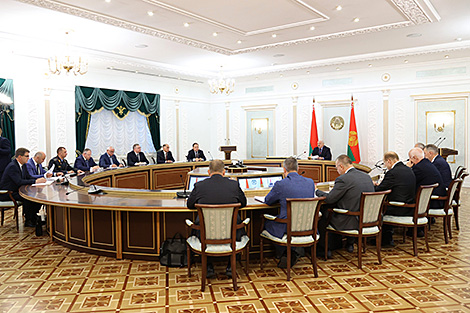
PRESIDENTIAL ONE-ON-ONE. What do we know about Lukashenko’s meeting with Putin in St. Petersburg?
Aleksandr Lukashenko and Vladimir Putin had previously agreed to meet in St. Petersburg on 23 July. The presidents turned up for the official part of the negotiations together and without ties. The fact gave certain informal tone to the conversation. And the consequent joint program and plans of the leaders only confirmed it.
Vladimir Putin stressed: “At the beginning of the meeting I would like to note that all our plans are being implemented, even at a better pace than you and I expected.”
Vladimir Putin remarked upon the good state of the Belarusian economy and the Russian one, annual economic growth projections, proper realization of plans concerning the construction of the Union State of Belarus and Russia, and other accomplishments in joint work. “So, everything is moving in a satisfactory manner at least, to put it modestly. Of course, we will also talk about security issues in the region. I hope that today and tomorrow we will have an opportunity to discuss all of it in an informal setting in great detail,” the Russian president said.
In his opening address Aleksandr Lukashenko mentioned many things, including progress of Russia’s special military operation in Ukraine, the lack of results from the Ukrainian army’s counteroffensive, and an increase in NATO’s military activities in Poland. Plans to advance Belarus-Russia economic cooperation represented another important matter.

“We will not manage to discuss everything within a day. This is why we will spend time tomorrow, too. I understand that you will find the time for us to talk,” the Belarus president asked his Russian counterpart.
“Certainly, I’ve adjusted some of my plans. You and I can calmly keep talking for a day and a half. Two days,” Vladimir Putin confirmed.
“Excellent! Well, we will settle these issues in a day and a half,” Aleksandr Lukashenko said. “There is nothing extraordinary about it. We made the plans a long time ago and are meeting now. As we always say, if need be, we will meet at any time and discuss our tactical and strategic matters.”
After the official part of the talks in Konstantinovsky Palace the presidents of Belarus and Russia toured landmarks in Kronstadt. The heads of state first came to the Island of Forts Museum and Historical Park. They went to the Museum of Naval Glory in Kronstadt. Another point of the joint informal program of the presidents was a visit to the Stavropegic St. Nicholas Naval Cathedral in Kronstadt, also known as the Naval Cathedral of St. Nicholas the Wonderworker. This Orthodox church was the last and largest of the naval cathedrals built during the Russian Empire. It was built more than 100 years ago and is now believed to be the main temple of the Russian Navy. In Kronstadt Aleksandr Lukashenko and Vladimir Putin talked to local residents and tourists, who did not pass up the opportunity to pose for pictures together with them.
War against NATO and Russia’s accomplishments
Aleksandr Lukashenko said: “Yesterday was not an easy day. But this is according to our data. You will also share your opinion on this later on. It was a very complicated day. Fortunately, it ended well. According to our data, more than 15 Leopards [German-made tanks] and more than 20 Bradleys [U.S. infantry fighting vehicles] were destroyed in one firefight. This, I think, has never happened before. So much foreign hardware…”
“The thing is on the other side they used units fully equipped with foreign hardware,” Vladimir Putin noted.
Aleksandr Lukashenko stressed that the destruction of such a large amount of hardware also testifies to the heavy losses of the Ukrainian army: “One can estimate how many Ukrainian soldiers died considering the number of destroyed vehicles. I know this because I served as an officer in an armored unit back in the day. Therefore, I understand what it means to destroy so many infantry fighting vehicles and, most importantly, much vaunted Leopards.”
The Belarusian president cited the U.S. estimates which indicate that the Armed Forces of Ukraine lost 26,000 soldiers since the start of the counteroffensive.
“More than that,” Vladimir Putin said.
Aleksandr Lukashenko noted: “It is more now. But a week ago they estimated it at over 26,000. Since 4 June [from the launch of the counteroffensive]. I put their data down.”
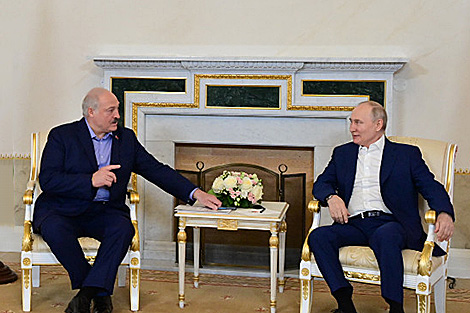
“Even more,” the Russian leader said affirmatively.
Aleksandr Lukashenko continued: “Yesterday showed that this is a war against the entire NATO. They arm them and send a lot of mercenaries there. Yesterday was an important day because they made use of the main strategic reserves. This suggests that this thoughtless policy of throwing untrained people and mercenaries into hell will lead nowhere.”
During the meeting Vladimir Putin noted that foreign mercenaries also suffer significant losses.
“Huge losses. Because of their tactics,” Aleksandr Lukashenko said.
“Because of their stupidity,” the Russian leader clarified.
“They move in groups,” the Belarusian president said.
In turn, Vladimir Putin stressed that people of the countries whose governments are sending people to the war zone should also be aware of what is happening. “And we will communicate this to the people so that they assess the actions of their rulers,” he said.
Gratitude to Putin for clear and open support
During the protocol part of the talks Aleksandr Lukashenko thanked Vladimir Putin for his recent statement concerning security guarantees for Belarus.
“I simply want to thank you. You are absolutely the first person in Russia to talk about it openly, clearly and understandably. If god forbid there is aggression against Belarus, it will be treated as aggression against Russia. We take it into account as we build our Armed Forces,” the Belarusian head of state said.
BelTA earlier quoted TASS as saying that at an operational meeting with permanent members of the Security Council of the Russian Federation on 21 July, Vladimir Putin said that aggression against Belarus would be considered an attack on the Russian Federation. In this case, Moscow will respond with all means at its disposal.
The failure of Ukrainian counteroffensive and troops in Poland
During the meeting Aleksandr Lukashenko noted that there is no Ukrainian counteroffensive.
“Yes, there is. It’s just failed,” the Russian president said.
The Belarusian leader confirmed: “It has failed. There are no results. What now? You said it right the other day when you mentioned that they have taken steps to get Poland involved. And they are actively involving mercenaries. I’ve specifically brought you a map showing the redeployment of Polish army units towards the borders of the Union State. You’ve talked about it. We see that they are setting the stage. One of the brigades has been redeployed to 40km away from Brest. It had been stationed about 500km away. Now the distance is 40km. I will show the map. We see it all. Another brigade is being redeployed a little more than 100km away from Grodno. Well, a division of theirs. But brigades have been redeployed so far. Poles have started repairing Leopards on their territory. And an airfield in Rzeszow has been reactivated. Americans and other ones are redeploying hardware to the airfield.”
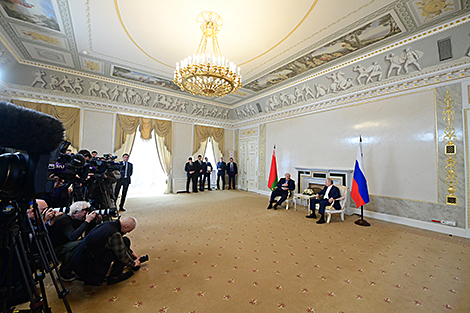
Smokescreen and plans of the West to dismember Ukraine
Speaking about military buildup in Poland and about the redeployment of considerable forces towards the border of the Union State of Belarus and Russia, Aleksandr Lukashenko pointed out that Poland wants to get something in return.
The Belarus president said: “It’s clear it will get money, weapons. This is understandable. But you’ve also mentioned it that there is a great deal of talk now about admitting Ukraine to NATO piece by piece. What’s behind it? It is a smokescreen. They want a piece of western Ukraine. Under the guise of admission to NATO so that the population would be okay with that. They want to chop off western Ukraine and merge it with Poland. It is Poland’s payment for active participation in this operation against troops of the Russian Federation. Americans support it.”
Aleksandr Lukashenko noted that the leaders of Belarus and Russia had seen it half a year before and had had a preliminary discussion about such an eventuality. “It is unacceptable for us. The separation of western Ukraine, the dismemberment of Ukraine and the transfer of the lands to Poland are unacceptable. If the western population of Ukraine needs it, then we will surely provide support to them. I ask you to discuss and think about this issue. Naturally, I would like you to support us in this regard. If the need for such support arises, if western Ukraine asks for help, then certainly we will provide assistance and support to people in western Ukraine. If this happens, we will support them in every possible way,” the Belarusian head of state stressed.
“It is unacceptable because we happen to feel the military influence of the Baltic states and Poles on the west. And we would feel the influence from the south, too. As you said, the Union State will still have to defend itself. Therefore, such approaches are unacceptable,” Aleksandr Lukashenko added.
He once again stressed that the parties intend to counteract such a development in every possible way. “I ask you to look into this issue in terms of our support for western Ukraine,” the Belarusian head of state noted addressing his Russian counterpart.

PMC Wagner’s “sightseeing” ideas
Aleksandr Lukashenko mentioned the desire of fighters of the private military company (PMC) Wagner to “go sightseeing” to Warsaw and Rzeszow: “Maybe I shouldn’t say it but I still will. PMC Wagner personnel are making us worried. They insist on going westward. They ask for permission. I say: ‘Why do you want to go westward?’ Well, and on the quiet... After all, we control what is happening. ‘Well, we will go to see the sights of Warsaw and Rzeszow.’ But they hold a grudge against Rzeszow. When they were fighting near Artyomovsk, they knew where the military hardware came from. They have this grudge inside them against Rzeszow. Of course, I keep them in the center of Belarus, as we agreed. I would not like to redeploy them there. Because they are in a bad mood. And I have to give them credit: they know what is happening around the Union State,” the Belarus president noted.
A Belarus-Russia joint economic plan
Speaking about economic cooperation, Aleksandr Lukashenko suggested instructing the governments of the two countries to think about the relevant plan for the long term. “Reliance on our own resources is the essence. We will not kowtow to anyone. We have brains. Resources are more than sufficient. We need a plan for the development of our Fatherland. As I say: two states, one Fatherland. And we can do it. But the main forces have been here, in Russia, since old times. It will be good if our governments come up with such a plan,” the Belarusian head of state said.
“And even if things are a little worse off, people will understand and support us. Because they will see the light at the end of the tunnel,” Aleksandr Lukashenko is convinced.
Moreover, Belarus and Russia have already started working towards it by advancing cooperation in such spheres as microelectronics, space exploration, and agriculture. “And we see good beginnings everywhere. So we need to put everything together into a plan, appoint people in charge. Thus we will do our job strategically,” the Belarus president said.
“Economy is the base. If there is economy, we will handle the rest,” the Belarusian leader is convinced.



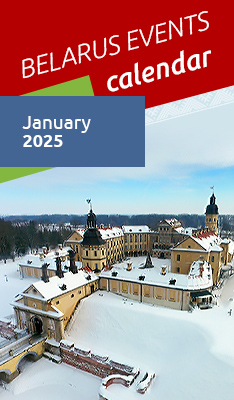




 print version
print version make home page
make home page add to bookmarks
add to bookmarks

